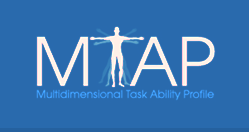The MTAP focuses on physical function rather than pain to determine limitations and problematic activity of daily living (ADL'S) and work capacity.
MTAP is a practical outcome tool for use in small, medium and large clinical settings. Baseline and serial testing provide automated scoring and reporting.
MTAP is highly reliable (r = 0.98, p < 0.05) and highly correlated with actual physical function as assessed during objective Functional Capacity Evaluation (FCE) lifting tasks (r = 0.89, p < 0.05).
MTAP meets the new recommendations for documentation of objective functional outcome measures (Medicare, Official Disability Guidelines (ODG), American College of Occupational and Environmental Medicine (ACOEM), and the Americian Medical Association (AMA) Guides to the Evaluation of Permanent Impairment, 5th and 6th editions).
The MTAP uses a sophisticated statistical analysis, including Item Response Theory (IRT) and Rasch Analysis to calibrate MTAP items to actual objective testing (FCE) in order to maximize the instrument's precision.
The most significant innovation of the MTAP is its simplicity of design in which illustrated items combined with short descriptions of common tasks common task including ADL'S and Work Activities. This allows for rapid cognitive processing, less ambiguity, and helps accommodate patients with low literacy levels and assist with cross-cultural adaptation.
The MTAP enhances communication with providers and patients-centered clinical care: Helps with defining treatment protocols (Identifies problematic ADL'S, correlates with rehab goals and objectives).
MTAP is a good educational tool and helpful to identify problematic ADL'S and work restrictions. Its emphasis of physical function helps with enhanced communication and patient education.
MTAP may assist with justification and medical necessity for treatment / rehab by providing a baseline, progress, plateau or decline of physical function via serial testing because it translates impairment into functional loss.
The MTAP may be a billable and reimbursable service for most providers, subject to medical necessity, documentation, policy benefits / limitations, providers specialty or scope of practice (MD, DO, DC, OT, PT, PhD)
